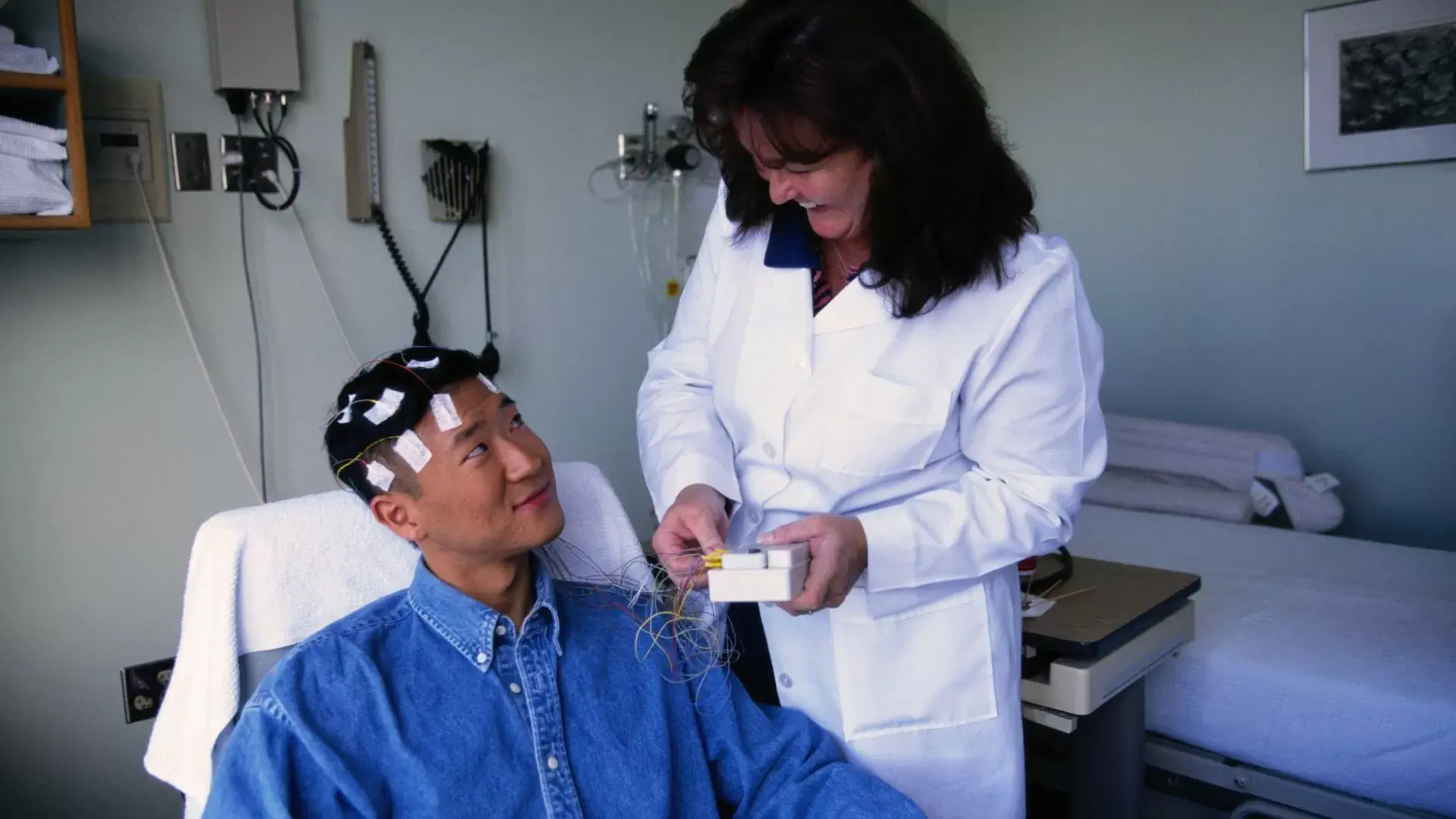As we explore the intersection of chiropractic care and epilepsy management, we recognize that many patients seek holistic approaches to complement their traditional treatments. Chiropractors focus on enhancing neurological function through personalized adjustments and lifestyle modifications, which may contribute to reduced seizure frequency and improved quality of life. By addressing spinal misalignments and promoting stress reduction, chiropractic care offers a unique perspective on managing epilepsy. However, the effectiveness and integration of these therapies warrant further discussion, especially regarding their potential impact on patient outcomes and overall well-being. What might this mean for those living with epilepsy?

At Physio Chiro Clinic, we offer a thorough range of physiotherapy and chiropractic services designed to address the unique needs of each patient, including those seeking support for epilepsy. Our focus is on providing tailored epilepsy treatment that helps manage epilepsy symptoms and enhances overall well-being.
We understand that epilepsy can be intertwined with various neurological disorders, and our approach includes extensive epilepsy rehabilitation. Our team is dedicated to helping patients navigate the challenges associated with seizure management and the stress that often accompanies this condition. By integrating alternative treatments for epilepsy, we aim to empower our patients and improve their quality of life.
We also prioritize educating our patients about the importance of epilepsy awareness and the resources available within the epilepsy community. Through workshops and support groups, we provide a platform for sharing experiences and strategies that can alleviate the impact of epilepsy on daily living.
Our physiotherapy and chiropractic services encompass gentle exercises and adjustments that can aid in reducing stress and tension, further supporting our patients’ journey towards better health. Together, we can work towards achieving ideal health and improved seizure management for those impacted by epilepsy.
Epilepsy can arise from various causes and risk factors, which makes understanding its origins vital for effective management and treatment. We are aware that epilepsy causes can be diverse, ranging from genetic predispositions to environmental influences. In our practice, we often encounter epilepsy in children and adults, each presenting unique challenges.
Common epilepsy triggers include stress, lack of sleep, and flashing lights, which can lead to increased risk of epileptic episodes. Stress-induced seizures are particularly concerning, as they can complicate an individual’s overall health and well-being.
When we consider epilepsy and genetics, we recognize that certain hereditary factors can greatly influence the likelihood of developing this condition. Additionally, epilepsy and brain injury are also closely related, as traumatic experiences can lead to structural changes in the brain that precipitate seizures.
Understanding these factors is essential for accurate epilepsy diagnosis and developing a tailored treatment plan. By being aware of potential epilepsy complications, we can better support individuals in managing their condition, improving their quality of life, and reducing the frequency and severity of seizures.
Various types of seizures can manifest in individuals with epilepsy, each presenting distinct symptoms that require careful observation and understanding for effective management. We categorize seizures primarily into focal and generalized seizures. Focal seizures, also known as partial seizures, occur in one area of the brain and can cause symptoms like unusual sensations or movements. Generalized seizures, on the other hand, involve the entire brain and include several subtypes.
Tonic-clonic seizures, a well-known type of generalized seizure, involve muscle stiffening and jerking movements. Absence seizures, often seen in children, may cause brief lapses in awareness. Myoclonic seizures are characterized by sudden, brief jerks of the body, while atonic seizures lead to a sudden loss of muscle tone, often resulting in falls.
Recognizing seizure warning signs is essential for safety and effective intervention. After a seizure, individuals may enter a postictal state, experiencing confusion or fatigue. It’s important for us to understand these symptoms and types to tailor epilepsy therapy effectively, ensuring that each patient receives the appropriate care and support necessary for their unique situation.
Chiropractic care may offer complementary support for individuals managing epilepsy, focusing on enhancing overall neurological function and reducing stress. Many of us know that epilepsy is a complex seizure disorder, often accompanied by challenges like anxiety and depression. By addressing lifestyle factors, chiropractic adjustments can potentially help in improving our overall well-being.
Research suggests that chiropractic care may aid in reducing stress levels, which is crucial for those living with epilepsy. Stress can exacerbate seizure frequency, so incorporating chiropractic techniques into our routine might support seizure prevention. Furthermore, some individuals find that chiropractic treatments can help alleviate discomfort associated with the side effects of epilepsy medications.
We should also consider how chiropractic care can promote holistic health, helping us maintain a balanced lifestyle. Regular adjustments may enhance our body’s ability to cope with the challenges of epilepsy and its related conditions. While it’s essential to follow our healthcare providers’ recommendations, including epilepsy support systems and medications, we can explore chiropractic care as an additional resource in our management plan. This integrative approach could foster a more thorough strategy for better living with epilepsy.

Understanding the intricate role of the nervous system is essential for grasping how epileptic disorders manifest and affect individuals. The nervous system is our body’s command center, and when it malfunctions, it can lead to seizures, a hallmark of epilepsy. For many people, epilepsy can be classified as a nervous system disorder, with variations like temporal lobe epilepsy or frontal lobe epilepsy impacting how we approach treatment.
In cases of refractory epilepsy or drug-resistant epilepsy, traditional management strategies may not suffice, prompting discussions about options like epilepsy surgery. To accurately diagnose and evaluate these conditions, medical professionals often utilize EEG and brain scans. These tools help us observe the brain’s electrical activity and identify seizure patterns, providing valuable insights into the underlying dysfunction.
Moreover, we must consider the relationship between epilepsy and sleep. Disrupted sleep can exacerbate seizures, making it vital for us to address sleep hygiene in management strategies. By acknowledging the nervous system’s role in epilepsy, we can better understand each patient’s unique experience and tailor our approach to their specific needs.
Exploring how chiropractic adjustments can influence neurological function offers valuable insights into potential complementary approaches for managing epilepsy and enhancing overall well-being. While seizure medications are often a primary treatment for various epilepsy syndromes, including absence epilepsy and intractable epilepsy, many individuals seek alternative therapies to support their health.
Chiropractic adjustments aim to optimize the nervous system’s function, potentially impacting how the brain processes signals associated with seizures. Some studies suggest that improving spinal alignment may enhance vagus nerve stimulation, which is known to aid epilepsy management. This connection underscores the importance of epilepsy monitoring and the need to assess various treatment options.
We should also consider the role of lifestyle factors, such as diet, alongside chiropractic care. The Epilepsy Foundation emphasizes that a thorough approach, including dietary changes, can be beneficial for many patients. By incorporating chiropractic adjustments into a broader management plan, we may help support neurological function and overall health. Ultimately, discussing these options with healthcare providers can lead to personalized strategies aimed at improving quality of life for those living with epilepsy.
Addressing spinal misalignment is essential for restoring nervous system balance, which can greatly influence seizure activity and overall health in individuals with epilepsy. Misalignments in the spine may disrupt the communication pathways in the nervous system, potentially exacerbating conditions like juvenile epilepsy, occipital lobe epilepsy, and parietal lobe epilepsy.
Chiropractic care aims to correct these misalignments, helping to improve the body’s ability to manage seizures. Many patients who rely on anticonvulsants for seizure control may find that chiropractic adjustments complement their treatment, especially for conditions such as Lennox-Gastaut syndrome and Dravet syndrome.
Through these adjustments, we can help reduce the frequency and severity of epileptic auras and enhance overall well-being. It’s important to remember that along with chiropractic care, an epilepsy-friendly diet and proper seizure first aid are vital components of a thorough management plan. For individuals undergoing MRI for epilepsy, addressing spinal health may also play a pivotal role in their treatment journey.
Recognizing the role of the vagus nerve in epilepsy can enhance our approach to managing seizures and improving overall patient outcomes. The vagus nerve plays a significant part in regulating brain activity and can influence seizure frequency and severity. For instance, some patients with photosensitive epilepsy may experience seizures triggered by flashing lights, while others might have nocturnal seizures that disrupt sleep.
Integrating a ketogenic diet for epilepsy has shown promise by altering metabolism and reducing seizure occurrences, potentially affecting the vagus nerve’s function. Additionally, we must consider lifestyle factors, such as epilepsy and alcohol or caffeine consumption, which can aggravate symptoms.
Patients often report concerns about epilepsy and memory loss, highlighting the importance of maintaining cognitive health. In instances of status epilepticus, understanding the vagus nerve’s role can guide us in emergency interventions.

Chiropractic care can play a pivotal role in reducing seizure triggers by addressing spinal misalignments that may affect nervous system function and overall wellbeing. At our clinic located at 123 ABC Road, Oakville, Ontario, we recognize the complexities of conditions like epilepsy, especially as they relate to factors such as epilepsy and stroke, epilepsy and head trauma, and even febrile seizures.
When we assess patients, we focus on the spine’s alignment and how it interacts with the nervous system. By correcting misalignments through gentle adjustments, we aim to improve nerve conduction and reduce potential seizure triggers. Our approach is tailored to each individual, ensuring that we consider specific histories, including any past head trauma or seizures.
We’re committed to providing a supportive environment and welcome any questions you may have. If you’re interested in learning how chiropractic care might benefit you or a loved one, don’t hesitate to reach out to us at 111-111-1111. Together, we can explore effective strategies to enhance your quality of life and manage seizure triggers more effectively.
Incorporating complementary therapies, such as lifestyle modifications and nutritional adjustments, can greatly enhance the management of epilepsy alongside traditional treatments. We can start by focusing on a balanced diet rich in omega-3 fatty acids, antioxidants, and vitamins, as these nutrients may support brain health and potentially reduce seizure frequency.
Additionally, we should consider maintaining regular meal times to stabilize blood sugar levels, which can be essential for those living with epilepsy. Hydration is another key factor; staying well-hydrated can help with overall health and may influence seizure control.
Moreover, incorporating physical activity into our daily routine can help improve overall well-being, reduce stress, and enhance mood, which is beneficial for managing epilepsy.
Sleep hygiene is equally important; establishing a consistent sleep schedule can help prevent fatigue-related seizures.
Lastly, we shouldn’t overlook the significance of social support and connecting with others who understand our journey. By making these lifestyle and nutritional adjustments, we can take an active role in our epilepsy management, empowering ourselves to achieve a better quality of life.
Managing epilepsy effectively involves understanding various factors that can trigger seizures, including stress and anxiety, which can greatly impact our overall well-being. We understand that both stress and anxiety can lead to an increase in seizure frequency and severity, creating a cycle that can feel overwhelming. Recognizing this connection is essential for us as we navigate our epilepsy journey.
When we’re under stress, our bodies release hormones that can disrupt our neurological balance. This can heighten our sensitivity to seizure triggers, making it imperative to implement stress-reduction techniques. Mindfulness practices, such as meditation and deep-breathing exercises, are effective tools for managing anxiety and stress levels.
Additionally, maintaining a supportive environment plays a key role in mitigating these feelings. Engaging with family, friends, and healthcare professionals can foster a sense of security and understanding, helping us better cope with our condition.
Exploring chiropractic support options can offer families valuable insights into complementary approaches for managing epilepsy in children. Many parents are seeking holistic methods to enhance their child’s overall well-being, and chiropractic care has emerged as a potential avenue worth considering.
Chiropractors focus on the relationship between the nervous system and overall health, which can be particularly relevant for children with epilepsy. Through gentle spinal adjustments and other techniques, chiropractors aim to improve nervous system function, potentially reducing the frequency and severity of seizures. While research in this area is still developing, some families report positive outcomes when integrating chiropractic care into their child’s management plan.
It’s crucial for us to collaborate closely with healthcare professionals, including neurologists and pediatricians, to guarantee an all-encompassing approach. Before starting chiropractic treatment, we should discuss our child’s specific needs and medical history with the chiropractor. This collaboration can help tailor the care to our child’s unique situation, promoting a supportive environment.
Ultimately, we’re encouraged to remain open-minded while prioritizing our child’s health and safety. By exploring chiropractic support, we may discover additional tools to improve our children’s quality of life.
While chiropractic care may offer supportive benefits for children with epilepsy, it’s important to also address the pain and muscle tension that can accompany the condition. Many of us know that the physical effects of seizures can lead to discomfort, stiffness, and soreness in various muscle groups. This tension can sometimes exacerbate the overall stress experienced by patients and their families.
Chiropractic adjustments can help alleviate this discomfort by improving spinal alignment and enhancing muscle function. By working to restore proper biomechanics, we can reduce pain levels and improve mobility. Regular chiropractic sessions may also promote relaxation, which can be essential in managing the emotional and physical stressors associated with epilepsy.
In addition to adjustments, our chiropractic practice may incorporate therapeutic exercises and stretches tailored to the needs of each child. These methods help strengthen muscles and increase flexibility, reducing the risk of injury and enhancing overall well-being.
Ultimately, by addressing pain and muscle tension through chiropractic care, we can create a more supportive environment for children with epilepsy, allowing them to focus on their daily lives with greater ease and comfort.
Incorporating holistic approaches into our care can greatly enhance seizure prevention and overall well-being for children with epilepsy. By focusing on the whole child—mind, body, and spirit—we can create a supportive environment that fosters health and resilience.
One key component of a holistic approach is nutrition. A well-balanced diet rich in omega-3 fatty acids, antioxidants, and vitamins may help improve brain health and reduce seizure frequency. Additionally, we can explore dietary therapies, such as the ketogenic diet, known for its potential benefits in epilepsy management.
Stress management techniques are another essential aspect. Regular practices like mindfulness, meditation, and yoga can help children develop coping strategies, ultimately reducing stress levels that may trigger seizures.
Physical activity also plays a significant role in our holistic strategy. Engaging in regular, age-appropriate exercise can improve physical health, enhance mood, and provide a positive outlet for energy.
Lastly, fostering strong social support networks—whether through family, friends, or support groups—can promote emotional well-being. By combining these holistic methods, we can empower our children to lead healthier, more fulfilling lives while effectively managing their epilepsy.
During a chiropractic consultation for epilepsy, we can expect a thorough assessment that includes a review of the patient’s medical history, lifestyle factors, and specific seizure triggers. Our chiropractor will ask about the frequency and type of seizures, as well as any medications currently being taken. This information helps them understand how epilepsy affects our daily lives.
Next, we’ll undergo a physical examination focused on the spine and nervous system. Our chiropractor may check for misalignments or areas of tension that could contribute to nerve interference. They’ll likely assess our posture and range of motion, emphasizing the connection between the spine and overall health.
After the assessment, we’ll discuss the findings and potential treatment options tailored to our needs. This may include spinal adjustments, soft tissue therapy, and lifestyle recommendations aimed at reducing stress and improving overall well-being. Importantly, our chiropractor will emphasize the importance of working alongside our primary healthcare providers, ensuring a collaborative approach to managing epilepsy.
After understanding what to expect during our chiropractic consultation, we can take the next step by booking an appointment to explore how chiropractic care can support our management of epilepsy. This proactive approach allows us to work closely with a qualified chiropractor who understands our unique health needs.
When we schedule our appointment, we should consider sharing our medical history and current treatment plans, as this information is vital for developing a tailored care strategy. During our visit, the chiropractor will assess our spinal alignment and overall health, helping us identify potential areas for improvement that may contribute to better seizure management.
It’s also essential for us to discuss any medication we’re currently taking and how chiropractic care can complement our existing treatments. Our chiropractor may recommend specific adjustments, exercises, or lifestyle changes to support our overall well-being.
We recognize that many people seek alternative treatments for various health conditions. However, it’s crucial to acknowledge that chiropractic care isn’t a cure-all. While it may provide relief for some musculoskeletal issues, there’s no scientific evidence to suggest it can completely cure epilepsy. Our focus should be on thorough care that includes medical advice and treatment plans tailored to each individual’s needs. We encourage patients to consult with healthcare professionals for the best outcomes.
When considering chiropractic treatment, we should be aware of potential risks. While many people benefit from chiropractic care, side effects can include soreness or discomfort, particularly after adjustments. In some cases, serious complications like vertebral artery dissection can occur, although they’re rare. It’s essential for us to discuss our medical history and conditions with the chiropractor to guarantee safe and effective treatment tailored to our needs. Open communication is key for our well-being.
When considering how often we should visit a chiropractor, it largely depends on our individual needs and conditions. Typically, we might start with weekly visits, then reassess based on our progress. It’s important to communicate openly with our chiropractor about any changes in our symptoms or overall health. Regular check-ins can help us determine the best frequency for our visits, ensuring we receive the most benefit from our chiropractic care.
When we consider whether insurance plans typically cover chiropractic care, it’s crucial to check our specific policy details. Many plans do include chiropractic services, but coverage can vary widely. We should review our benefits and discuss with our insurance provider to understand what’s covered. Additionally, some plans may require referrals or have limits on the number of visits, so it’s a good idea to familiarize ourselves with the terms for ideal care.
When considering chiropractic adjustments, we should be aware that they can potentially interact with medications, including those for epilepsy. While adjustments might not directly affect the medication’s efficacy, they could influence our overall health and stress levels, which are important for seizure management. It’s vital for us to communicate openly with both our chiropractor and healthcare providers to guarantee a coordinated approach to our care, prioritizing our safety and well-being.
Reach out to us today to book an appointment or learn more about our services. Our friendly team is here to answer your questions and help you take the first step toward improved health and wellness.
(647) 372-1209

At our Physio-Chiro Clinic, we are dedicated to providing personalized care that addresses the root cause of your discomfort. With a team of experienced physiotherapists and chiropractors, we focus on restoring your mobility, relieving pain, and enhancing your overall well-being.